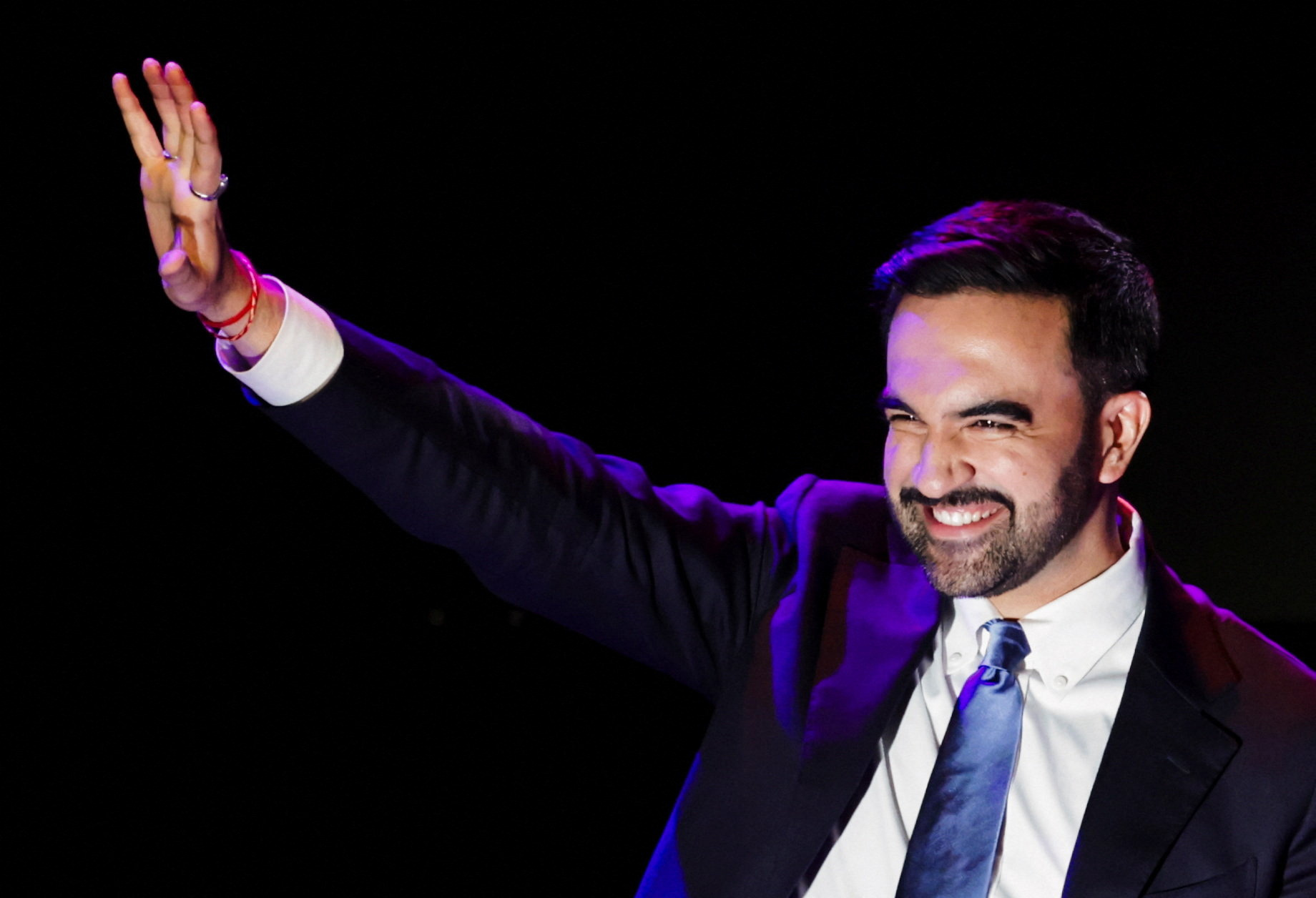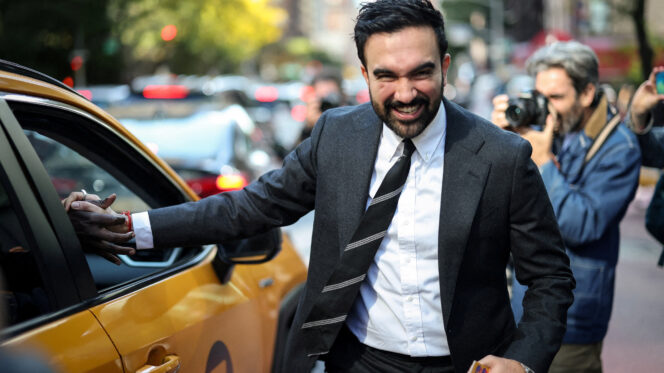Democrats Whined About Trump. Zohran Mamdani Offered an Alternative

Nine months ago, I listened to New York state assemblyman Zohran Kwame Mamdani pitch his mayoral campaign on the Chapo Trap House podcast. I found him impressive, and could immediately see he was drawing from the Bernie Sanders playbook in the best possible way. Sanders’ 2016 presidential run was strongest, Mamdani told co-host Will Menaker, “was when it spoke in a universal language, and when it spoke to everyone at all times, understanding that that is how we can build the broadest coalition.” Throughout the rest of the interview, Mamdani returned again and again to an economic agenda built around the sorts of commonsense social democratic initiatives – rent freezes, free bus service, public grocery stores, universal childcare – that twice brought Sanders to the precipice of winning the Democratic nomination for president. Mamdani’s campaign, it seemed to me, was clearly a breath of fresh air and an example of what a disciplined left populism can look like, a tiny beam of light cutting through the noxious gloom of Trump’s America. But truth be told, I ultimately imagined its horizons would be quite limited.
As recently as February, Mamdani was polling at around 5% in a crowded Democratic primary field whose frontrunner by a country mile was former governor Andrew Cuomo, a once-prominent Trump critic whose popularity in the early days of the Covid-19 pandemic briefly inspired the term “Cuomosexual”. At that time, Mamdani looked like the kind of talented, well-meaning left politician we’ve so frequently seen thwarted by America’s ossified political system. Perhaps, I thought, he’d score a spirited 19% against the vile Cuomo and eventually run for Congress. Since 2017, organisations like the Democratic Socialists of America (DSA) have managed a string of impressive electoral victories for their candidates, notably representatives Alexandria Ocasio-Cortez and Rashida Tlaib. But a mayoral run against the Cuomo death star, fronted by a Muslim lawmaker who supports the Boycott, Divestment, Sanctions movement? That seemed to have “moral victory” written all over it. How deliciously wrong I was.
Since the start of the year, Mamdani has shattered every doubt about the viability of his campaign for mayor: ascending in the polls; mobilising an army of nearly 100,000 volunteers; and crushing the once-invincible Cuomo by 13 points in June’s Democratic primary. Yesterday’s result, a majority win of more than 50% (with 91% of the votes counted), probably exceeds even the wildest expectations of many of his supporters.
Mamdani possesses that ineffable ability to communicate leftwing policies in the register of practicality and common sense. Projecting a spirit of joyful struggle through his thousand-kilowatt smile, he succeeds in naming enemies and leaning headfirst into confrontation without ever seeming dour or superior. In a political and media ecosystem where authenticity has become scarce as stardust, Mamdani managed to remain natural without eschewing message discipline or resorting to empty theatrics. And while politicians of the liberal mainstream increasingly preach defeat and despair, his campaign did the opposite. As Democratic organiser Waleed Shahid wrote in Jacobin last month:
Where others narrate decline, [Mamdani] sees a place worth fixing. That is what Democrats too often miss. A politics built only around fear or opposition cannot inspire; it can only react and manage. What’s needed is a politics that treats people not as victims of crisis but as co-authors of what can still be repaired and built. Mamdani unsettles that picture because he seems to operate by a different logic than the party around him. To consultants, he looks like a curiosity: a young democratic socialist with TikTok fluency and diasporic ease, part of a new class of politicians who seem born to go viral. But what sets him apart isn’t novelty; it’s conviction. He carries himself like a happy warrior – alive to the absurdities of politics, unwilling to surrender its possibilities … For him, conflict isn’t a distraction from governing; it’s the entry point for persuasion. The goal is not to perform anger but to focus it, to remind people that politics can still change the price of the things that govern their days.
For as long as I can remember, liberal politicians and centrist wonks have done their utmost to means-test their policy offerings to oblivion and make them as complicated as possible, as if convolution were somehow an end in itself. The Mamdani campaign’s dogged emphasis on affordability – reflected in a program that is both fiercely social democratic and refreshingly easy to explain – has been its greatest strength. In the mould of Sanders at his best, Mamdani has ditched technocracy for universalism and plain speech.
Though ambitious in scope, there is a modesty to Mamdani’s agenda that makes his critics’ charges of utopianism sound absurd. His rent freeze proposal will apply only to rent-stabilised units, offering basic relief to roughly two of New York’s three million tenants. He plans to build five city-run, non-profit grocery stores, not expropriate every bodega or supermarket. Free buses will speed up transit, improve safety for both riders and drivers, and leave valuable dollars in commuters’ pockets, but won’t collapse the city’s cavernous racial wealth gap. Coupled with free childcare and a gradual increase to the city’s minimum wage to $30 an hour by 2030, it’s a bread-and-butter program designed to make life in one of the world’s biggest metropoles slightly less arduous for the average person. No more, no less.
The radical élan of Mamdani’s campaign has instead come from its genuine interest in movement-building and the much slower, unglamorous work this involves. Much as centrist commentators insist it can, a left electoral juggernaut cannot succeed on clever policy or slick comms alone. It must also infuse its supporters with a sense of political agency. Policy and message discipline notwithstanding, this was the final, precious element in Mamdani’s victory.
It’s also an outcome linked to the specific context of New York politics in 2025. Unpopular, corrupt and federally indicted, the city’s incumbent mayor, Eric Adams, was never going to get reelected. That left Cuomo – a sentient stack of sexual harassment lawsuits and a walking monument to the bipartisan rot of America’s political class – as the standard-bearer of the anti-Mamdani coalition, still formidable but deeply compromised.
On a national level, Mamdani’s victory also owes itself to a wider collapse in support for the Democratic establishment among America’s liberal rank and file. Politically flaccid and visibly resigned to the idea of simply waiting out Trump’s second term, Democrat leaders like Senator Chuck Schumer and Congressman Hakeem Jeffries (both of whom, not incidentally, hail from New York) have managed to become more unpopular with Democratic voters than any of their predecessors. Facing the collapse of their mandates after losing to Trump a second time and supporting an active genocide opposed by nearly 80% of their own supporters, Democratic party elites and their media surrogates have contemptibly responded with ersatz rebrand attempts like the “abundance agenda”, named after a book by New York Times columnist Ezra Klein and co-author Derek Thompson. Absent these factors, even a politician of Mamdani’s talent with the same movement behind him could have failed to break through.
Still, it’s worth pausing to consider just how improbable this result is. Even after his stunning primary win in the summer, Mamdani continued to face an organised, lavishly-financed and unapologetically racist campaign of opposition from virtually every corner of the political, economic and media establishment. In both its scale and ugliness, it has been a demonisation effort with few real parallels in modern history, sufficiently devoid of scruples to artificially darken his beard, suggest he poses an existential threat to Jewish New Yorkers (who in fact support him in considerable numbers) and imply he would welcome a second 9/11. Last night, all this crashed against the rocks of a rainbow coalition representing the broadest swathes of New York. Amid the increasingly sinister and xenophobic backdrop of Trump’s America, Mamdani’s win is a defiant affirmation of pluralism.
For the left, Mamdani’s victory will now be a critical test. When he enters the New York mayor’s office on 1 January, his visibility and status will be close to those of a world leader. Oligarchs, generally loath to tolerate even mild social democracy, will fight it especially hard in the longtime epicentre of global finance, doing everything they can to thwart Mamdani’s agenda. If that agenda has any hope of succeeding, he and his supporters will have to remain every bit as nimble and disciplined as they’ve been on the campaign trail. New York’s mayor-elect said as much himself at his victory rally:
I cannot transform City Hall alone. As we walked across the bridge this morning, I held one corner of the banner that you see here. But I could not hold it on my own. I needed my partners in labour. I needed my partners in elected office. I needed my partners in everyday New Yorkers who are sick of being let down by those that they elect. I needed them to help me carry this banner and to help me carry this light.
Mayor Mamdani will need all these things and more besides. For now, he has two months to luxuriate in victory, his drubbing of Andrew Cuomo the most significant electoral victory America’s left has seen in years – and an inspiring example to be emulated elsewhere.
Luke Savage is a Jacobin columnist and the author of The Dead Center: Reflections on Liberalism and Democracy After the End of History.


